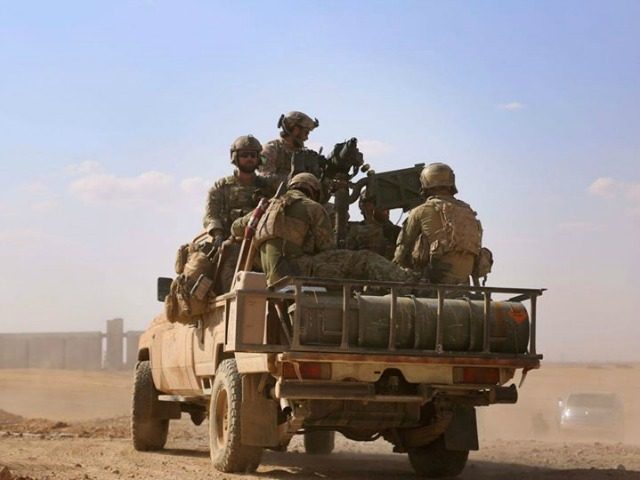A Saudi Arabian general has announced that the kingdom is “ready” to participate in any action to retake the city of Raqqa, Syria, from the Islamic State, complicating an already tense situation between a variety of militias and state militaries looking to engage the terrorist group in their de facto “capital.”
“The kingdom is committed to the fight against ISIS in Syria as part of an international coalition, including air sorties delegated to it, whether from within the kingdom or via its warplanes stationed at the Turkish Incirlik base,” Arab Coalition spokesman Maj Gen. Ahmed Al-Assiri told the Saudi-based al-Arabiya.
The Turkish state news organization Anadolu Agency expands on al-Assiri‘s comments in the same interview, which was broadcast on Al Arabiya. “Brigadier-General Ahmed al-Asiri noted that, since September of 2014, Saudi Arabian warplanes had carried out more than 200 airstrikes against Daesh targets — he did not specify where — as part of a U.S.-led international coalition established to fight the terrorist group.”
Al-Assiri was clear that Saudi Arabia wanted no part in the sister military operation to rid the city of Mosul, Iraq from the Islamic State due to the participation of Shiite militias there. Saudi Arabia “cannot take part in operations alongside militias,” he stressed.
The operation to liberate Mosul is underway, led by the Iraqi army backed by a U.S. air offensive, the Kurdish Peshmerga forces, and a group of mostly Shiite militias known as the Popular Mobilization Forces (PMF). The Iraqi government has promised that the Shiite militias will not enter the inner city of Mosul, leaving that work exclusively to Baghdad’s forces, as the Kurds and U.S. troops in special roles on the group would be placed in danger if so. The Shiite militias are largely funded by Iran and have ties to the terrorist group Hezbollah; they have promised to enter the fray “without anyone’s permission.”
American officials have made clear that they wish to see the parallel operation in Raqqa begin soon. Defense Secretary Ashton Carter has promised that the U.S.-backed operation in Raqqa will begin in “weeks,” but has refused to provide a clearer timeline: “This is, as always, a matter when you’re positioning forces and so forth, we have a plan to do that and a schedule to do that, and that plan has us generating those forces in a matter of weeks.”
Speaking to reporters from Baghdad Wednesday, Lt. Gen. Stephen Townsend, commander of the U.S.-led coalition fighting Islamic State in Iraq and Syria, said the only group “capable on any near frame” is the Syrian Democratic Forces, which includes the Kurdish YPG.
“We’re negotiating, we’re planning, we’re having talks with Turkey and we’re going to take this in steps,” Townsend said. He said another big chunk of the Syrian Democratic Forces consists of Arab fighters from the region around Raqqa.
“We’re prepared for this,” Col. Haitham Afisi, the brigade’s commander, said in a phone interview from the Syrian frontier in Aleppo province, where it’s been pushing the jihadists from territory bordering Turkey. “It will be a tougher war than the one in Mosul because there will be a concentration of Islamic State there and eliminating them will be harder. But the coordination between the Free Syrian Army and the coalition will be greater.”
In Raqqa, the panorama of different militias participating in a liberation operation differs from that in Raqqa, with Shiite militias playing a negligible role if any. Iran’s mercenaries in Syria are stationed in Aleppo, where there is no significant Islamic State presence, but anti-Assad militias have significantly damaged the Syrian army. Aleppo is over 500 miles northwest of Raqqa.
In Raqqa, the United States must quell a different sectarian rivalry: the government of Turkey wants to participate in the liberation of the city, but refuses to do so if the Syrian Kurdish militia, known as the YPG (People’s Protection Units), also participates. At the moment, U.S. authorities have confirmed that the YPG is the “only force that is capable on any near-term timeline” to participate in the fighting, according to Army Lieutenant General Stephen Townsend.
“We’re having talks with Turkey and we’re going to take this in steps,” Townsend said.
Turkish President Recep Tayyip Erdogan, who has welcomed the U.S.’s invitation to participate in the liberation of Raqqa, is now demanding that the Free Syrian Army elements near the city participate instead.
“We do not need terrorist organizations like the PYD and YPG [Kurdish People’s Protection Units]. The PYD and PKK are the same. ‘Let’s together oust DAESH [ISIS] from Raqqa together. We have this power,’ we told [the Americans]. What are they? They’re a simple terror organization,” Erdoğan said on Thursday.

COMMENTS
Please let us know if you're having issues with commenting.